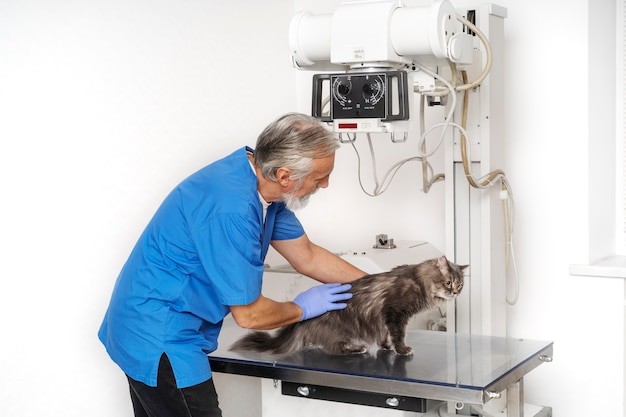Pet Ultrasounds: How Diagnostic Imaging Supports Accurate Treatment


Pet Ultrasounds: How Diagnostic Imaging Supports Accurate Treatment
Understanding the Power of Pet Ultrasounds in Haddon Heights
When your pet starts showing symptoms you cannot quite explain, the uncertainty can be overwhelming. Whether your dog is suddenly less active, your cat is eating less, or you notice changes in bathroom habits, you want answers—and you want them fast. At Haddon Veterinary Clinic, we understand how important it is to pinpoint the cause of your pet’s discomfort. Located right in 2 2nd Ave, Haddon Heights, NJ 08035, our team of veterinarians uses advanced pet ultrasounds to give you those answers quickly and compassionately.
Pet ultrasounds are a crucial part of veterinary diagnostic imaging in Haddon Heights, providing a safe, non-invasive way to look inside your pet’s body. This technology helps our veterinary professionals develop accurate treatment plans that are tailored to your pet’s unique needs. In this blog, you’ll learn when ultrasounds are recommended, what the process involves, and how our approach at Haddon Veterinary Clinic supports both you and your pet every step of the way. We’ll also discuss how our diagnostic imaging services can benefit pets from Haddon Heights and surrounding communities, helping you feel confident the next time you search for a “vet near me.” For more details on our imaging capabilities, you can explore our ultrasounds for pets page.
Recognizing When Your Pet Might Need an Ultrasound
Understanding when your pet may benefit from a veterinary ultrasound can be challenging, especially since animals are experts at hiding discomfort. Key symptoms that often prompt pet owners to seek advanced diagnostics include unexplained weight loss, vomiting that lasts more than a day or two, ongoing diarrhea, or sudden changes in urination and water intake. Additionally, if you notice abdominal swelling, lethargy, persistent coughing, or difficulty breathing, your pet may need further evaluation with pet ultrasounds in Haddon Heights.
Veterinary diagnostic imaging is also recommended when initial examinations and routine testing do not provide clear answers. For example, if your cat appears to be in pain or your dog has a chronic limp that doesn’t resolve with rest, your veterinarian might suggest additional imaging to rule out internal issues. Sometimes, even subtle changes such as decreased appetite or increased hiding behavior can be early indicators that something deeper is wrong.
If you ever find yourself unsure, remember that early evaluation at a quality veterinary services provider near you can make a significant difference in your pet’s health outcome. Our veterinary team will guide you through the steps needed to determine if an ultrasound is the best next move for your furry family member.
The Role of Veterinary Diagnostic Imaging: Why and How Pet Ultrasounds Work
What Makes Pet Ultrasounds Essential in Veterinary Medicine?
Pet ultrasounds are an invaluable tool for diagnosing a wide range of health conditions. This technology works by using high-frequency sound waves to create detailed images of your pet’s internal organs, including the liver, kidneys, bladder, heart, and reproductive organs. Unlike X-rays, which are ideal for visualizing bones, ultrasounds excel at revealing soft tissue structures and helping veterinarians assess conditions that might otherwise go unnoticed.
Common reasons for veterinary diagnostic imaging in Haddon Heights include investigating causes of abdominal pain, monitoring pregnancies, evaluating heart function, and identifying growths or masses inside the body. If your pet ingests something they should not have or develops a sudden distended belly, an ultrasound can quickly help our veterinary professionals determine the best course of action.
Ultrasounds are also a key component of more comprehensive diagnostic workups. For example, if routine bloodwork indicates liver or kidney abnormalities, an ultrasound may be performed to visualize those organs in detail. This approach helps ensure that we catch potential issues early and provide effective treatment from the start.
What to Expect During the Pet Ultrasound Process
The idea of advanced imaging can be intimidating for pet owners, but the process at Haddon Veterinary Clinic is designed with your pet’s comfort in mind. Most ultrasounds are performed with your pet lying comfortably on a padded surface, sometimes with gentle restraint or mild sedation if your pet is anxious. The veterinary team will apply a special gel to the area being examined to help the ultrasound probe glide smoothly and transmit sound waves effectively.
The procedure is painless and generally takes between 20 to 45 minutes, depending on the area being evaluated. Our veterinarians review the images in real time, often discussing findings with you shortly after the procedure. If additional diagnostics are needed, such as lab work or radiographs, we will explain these recommendations and how they fit into your pet’s overall care plan.
For more information about our comprehensive diagnostic capabilities, you can read about our diagnostic laboratory services for pets and how they complement ultrasound imaging.
How Pet Ultrasounds Guide Accurate Treatment and Improved Outcomes
Tailoring Treatment Plans with Clear Imaging
One of the greatest advantages of pet ultrasounds in Haddon Heights is their ability to guide precise treatment decisions. Clear, real-time images allow our veterinary team to identify the exact nature and location of a problem, whether it’s a tumor, cyst, fluid buildup, or a foreign object. With this knowledge, we can recommend targeted therapies, medications, or surgical options that are specifically suited to your pet’s needs.
For instance, if an ultrasound reveals a benign cyst in your cat’s kidney, your veterinarian may suggest regular monitoring rather than immediate intervention. Conversely, if a suspicious mass is detected, a guided biopsy can be performed with minimal discomfort, providing essential information for the next steps. In cases of heart disease, ultrasound imaging (echocardiography) helps us determine the best medications and lifestyle changes to support your pet’s long-term well-being.
Our goal is always to provide the most effective and least invasive solutions. By combining pet ultrasounds with other advanced diagnostics, such as digital radiology for pets, we can offer comprehensive care for complex cases and peace of mind for you.
Managing Chronic Conditions and Monitoring Progress
Ultrasounds aren’t just for emergencies or new health issues. They are also valuable for monitoring chronic conditions, such as heart disease, liver problems, or bladder stones. If your dog is on long-term medication for a heart condition, regular ultrasound exams help us track how well the treatment is working and make timely adjustments if needed.
When your pet is recovering from surgery or treatment for a serious illness, ultrasounds give our veterinarians a safe, repeatable way to check healing progress and detect any complications early. This means you can feel confident that your pet is getting the ongoing, attentive care they deserve.
Steps You Can Take at Home and the Importance of Prevention
While advanced diagnostics like pet ultrasounds require a visit to your local veterinarian, there are important steps you can take at home to support your pet’s health. Monitoring your pet for subtle changes in appetite, energy, bathroom habits, or behavior is crucial. Keeping a journal of symptoms can help your veterinarian spot patterns and make more informed recommendations.
Providing a balanced diet, maintaining a healthy weight, and scheduling regular wellness examinations are key components of preventive care. Routine veterinary visits allow our team to catch issues early, sometimes before symptoms even appear, reducing the likelihood of needing emergency imaging or invasive procedures later.
If you are proactive about preventive care, you may be able to avoid some of the conditions that require veterinary diagnostic imaging in Haddon Heights. Our veterinary team is always available to discuss wellness strategies that fit your pet’s lifestyle and risk factors.
When to Schedule a Veterinary Visit for Diagnostic Imaging
Knowing when to seek veterinary care for potential internal health issues is vital. If your pet displays ongoing vomiting, diarrhea, abdominal swelling, sudden changes in urination, persistent coughing, or unexplained weight loss, schedule an appointment with your veterinarian as soon as possible. Additionally, if your pet has been diagnosed with a medical condition that requires monitoring, follow your veterinarian’s recommendations for ongoing imaging or lab work.
In some cases, your veterinarian may recommend imaging even if your pet’s symptoms seem mild. Early detection through pet ultrasounds in Haddon Heights can make a significant difference in treatment success and your pet’s long-term outcome. If you are ever uncertain about whether your pet needs more advanced care, do not hesitate to reach out to our veterinary professionals for guidance.
Remember, while home monitoring is valuable, it cannot replace the expertise and resources available at a full-service veterinary clinic. When in doubt, scheduling a comprehensive pet exam is the best way to ensure your pet’s health and comfort.
Compassionate Care and Advanced Imaging—Right Here in Haddon Heights
Your pet is a cherished member of your family, and their health and happiness matter deeply to you. At Haddon Veterinary Clinic, we are committed to providing the most advanced veterinary diagnostic imaging in Haddon Heights and surrounding communities. Our approach is rooted in compassion, expertise, and a dedication to clear communication, ensuring you always feel supported and informed.
If you notice concerning symptoms or your pet has an ongoing medical condition, do not wait. Schedule an appointment with our veterinary team today to discuss whether pet ultrasounds or other diagnostics are appropriate for your pet. You can also learn more about our ultrasound services for pets or arrange for a comprehensive pet exam to stay ahead of health concerns.
For compassionate, precise care from the best veterinarian near me, call Haddon Veterinary Clinic at (856) 263-2888 or visit us at 2 2nd Ave, Haddon Heights, NJ 08035. Let us help you ensure your pet receives the highest quality veterinary diagnostic imaging in Haddon Heights—because your pet deserves nothing less.
Medical Disclaimer: This blog is intended for informational purposes only and does not replace professional veterinary advice. If you have concerns about your pet’s health or believe your pet may need advanced diagnostics, please consult your veterinarian promptly.

.png)


